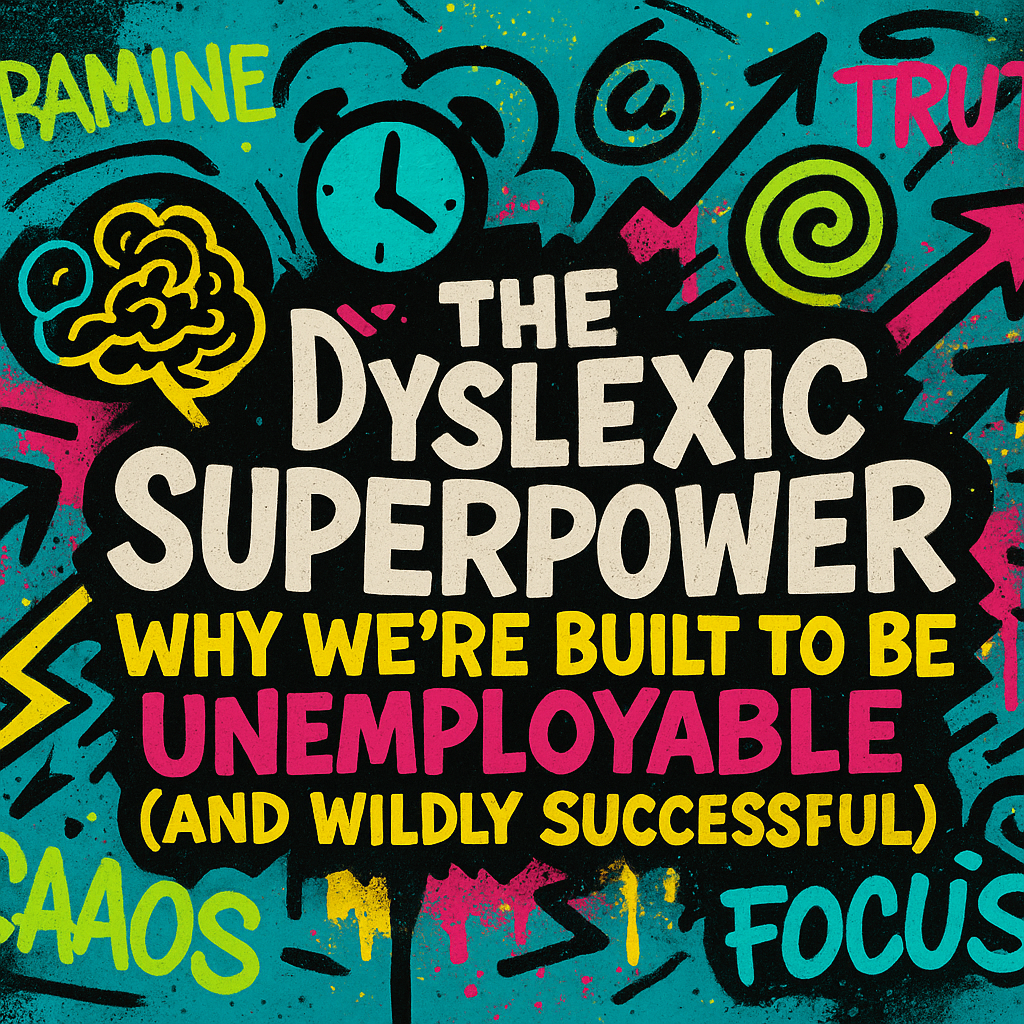
The Dyslexic Superpower Why We’re Built To Be Unemployable (and Wildly Successful)
Share
Ever feel like your brain has a completely different wiring from most people? That’s exactly what Stephen Martin and Darren Clark dive into on this episode of the Truth About Dyslexia. They open up about their real-world experiences running businesses as neurodivergent individuals, and it’s both refreshing and validating.
They explore how dyslexia and ADHD can be superpowers in entrepreneurship but also share the honest hurdles and burnout risks that come with it. From leaning on community support to figuring out how to pace yourself, there’s a lot of helpful insight for anyone who’s felt misunderstood or simply wants to do business on their own terms.
Navigating Neurodiversity in Business
The conversation starts by unravelling what it’s really like to be dyslexic in a fast-paced business world. Many dyslexics have unique perspectives, which can be a serious advantage when designing products or solving problems in creative ways. Yet it also means facing cynics who might question your methods.
A key point they bring up is how self-confidence can fluctuate. That sense of isolation, especially when you’re not wired like everyone else, can creep in. Darren points out that social media—and especially supportive groups—can help maintain that motivation. It’s not just about showing off. It’s about staying connected and reminding yourself you’re not alone.
“We don’t have to do it alone. The best part of being dyslexic is the community we build around us.”
Why Collaboration Fuels Growth
Ever try to do everything—and end up doing nothing well? For many dyslexics and ADHDers, collaboration is the missing puzzle piece. Working with people who have complementary skills lets you focus on your strengths without drowning in the stuff that drains you.
Stephen and Darren talk about how it’s not just about delegating tasks. It’s about building an environment where your unique thinking can thrive. That might mean partnering with someone who has more rigid organisational skills. It might also mean bringing in people who share your vision but can keep you grounded. No one wins when you try to tackle it all yourself.
Balancing Ambition With Self-Care
It’s easy to go all-in on a new idea, especially if you’re dyslexic and you’ve got that fire of inspiration. The pitfall? Burning out. Sustaining growth rarely happens overnight. Stephen compares it to a marathon—if you sprint the entire time, you’ll run out of steam and end up disappointed.
They highlight the importance of small, realistic goals. Sometimes we set the bar so high that we miss the everyday victories. It helps to remember that consistency is more valuable than instantaneous success. And the best way to keep that consistency is by giving yourself space to breathe.
Self-care can seem like a luxury, but it’s vital. Whether you recharge with a quick daily walk or something creative, refuelling your mind is key to long-term resilience. Think of it like an investment in your future focus and productivity.
Embracing Community and Purpose
Stephen and Darren underscore how a sense of purpose can be a powerful driver. If you’re building a brand that’s authentic to who you are, people feel that. Personal branding isn’t just about flashy graphics. It’s about showing your story and letting customers connect with the real you.
Community support also lifts the weight of isolation. The truth is, sharing personal stories fosters empathy. Whether you’re exchanging insights in a Facebook group or supporting each other’s creative solutions, there’s real magic in mutual encouragement.
When you align what you do with what you believe in, you start noticing a deeper sense of fulfilment. It’s no longer just about hitting targets. It’s about making an impact while staying true to your values.
- Social media can bridge gaps and keep you connected.
- Dyslexics often shine as entrepreneurs thanks to fresh perspectives.
- Collaboration is vital for overcoming personal limits.
- Realistic goals reduce burnout and maintain motivation.
- Sustainable, consistent progress trumps quick wins.
- Self-care is essential for staying energised and creative.
- Personal branding flourishes when it’s rooted in authenticity.
- Community support helps combat isolation and doubt.
- Embracing your purpose brings deeper fulfilment.
Want to hear Stephen Martin and Darren Clark’s full conversation? The podcast player is right at the top of this page. Tune in to learn more about how neurodiversity can be a strength in business, where to find the best communities, and how to build a brand that reflects who you really are.
If you’d like more resources, check out truthaboutdyslexia.com. You can also join our supportive Facebook group here: facebook.com/groups/adultdyslexia. Explore the Rightsiders supplement journey at addednutrition.com to learn more about boosting your brain and body.

